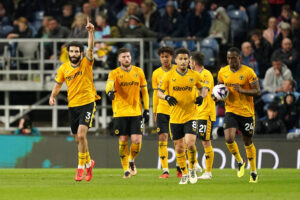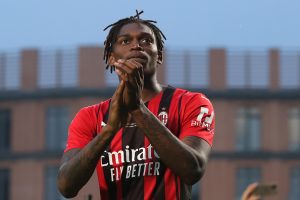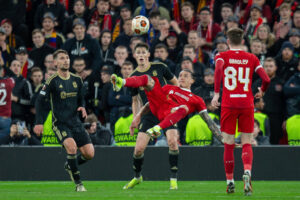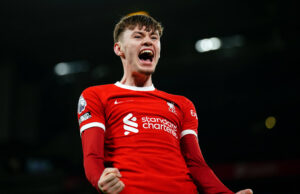In many ways, Arsène Wenger’s career will be remembered for the ‘what-if?’ moments as much as the never-ending supply of entertainment, quite literally from the sublime to the ridiculous; Arsenal‘s 1-0 win away to Real Madrid with a back four of Emmanuel Eboué, Kolo Touré, Philippe Senderos and Mathieu Flamini is just one example of both the former and the latter. What if he had gone to Bayern Munich in 1994, just months before he was sacked by Monaco, or the plethora of other footballing superpowers who have courted his services during his career? What if the title challenges in 1998-99, 2002-03, 2007-08 and beyond had not faltered? What if Roman Abramovich and the cult of the billionaire owner had never arrived in football?
That which will be left to hypotheticals more than anything else, however, is what might have been in Europe. Wenger has embarked on no fewer than 25 campaigns on the continent so far, but as he enters his 26th, he is yet to lift any silverware. This series looks at some of the chances at glory which he has missed, many of which will haunt both him and his fans for life.
For part one of the series, 1997-2000, click here. For part two, 2000-2003, click here.
The Annals of Arsenal’s Missed Opportunities in Europe: 2003-2006
2003-04
After throwing away the league title and missing yet another chance at the Champions League in 2002-03, Arsenal got off to a strong start in the Premier League. Lack of funds due to the ongoing move to the Emirates Stadium meant that they did not flex their muscles off the pitch as much as on it, and their only high-profile piece of business over the summer was replacing David Seaman with Jens Lehmann for just £1.5 million.
Despite their strong showings domestically, however, results were all too familiar for the Gunners on the continent. A shocking 3-0 defeat to Inter was followed by two more disappointments in Eastern Europe, as Wenger’s men drew 0-0 away to Lokomotiv Moscow and lost 2-1 against Dynamo Kyiv. Once again, they were on the brink of an early exit from the Champions League. Even if they won all three of their remaining games, the head-to-head rule and their currently shoddy goal difference meant that they were not guaranteed qualification.
The game at Highbury against Kyiv was an incredibly tense affair, but Ashley Cole kept the Gunners’ continental hopes alive with a late strike to make the score 1-0 and to give his side the head-to-head advantage over their opponents on away goals. Their job was far from over, however, as they went to the San Siro in need of a win and 3-0 down in the head-to-head against Inter.
What followed in that game was arguably Arsenal’s best performance under Wenger, as they tore apart one of the best teams in the world at the time. The score was 1-1 at half-time, but Freddie Ljungberg gave his side the lead early in the second half, before the team added another three goals in the last five minutes to win 5-1 and take control of their group.
Arsenal comfortably saw off Lokomotiv Moscow in the final game to top the group, but what will always be remembered will be that night in Milan. The victory on its own was historic, as no English side had won at the San Siro since 1961, but the manner in which they embarrassed such an illustrious side was simply unforgettable.
In the Last 16, a 3-2 win away to Celta Vigo was Wenger’s first win on Spanish soil in seven attempts, and Thierry Henry quickly put the tie to bed at Highbury by scoring twice in the first half. The 5-2 aggregate victory allowed for an all-English affair in the quarter-final, as the Gunners faced Chelsea, whom they had already beaten three times that season.
In the first leg, both teams fought hard and neither allowed the other to express themselves. Chelsea started to take control in the first half and took the lead through Eidur Gudjohnsen in the 53rd minute. They very nearly doubled their lead, and rued their missed chance as Pirès equalised just before the hour mark. The game ended 1-1, but the away goal meant that Arsenal were in an excellent position to go through to the semi-final.
Arsenal looked set to go through to their first Champions League semi-final. After creating several opportunities to score in the first half, they finally took the lead just before half-time through José Antonio Reyes. All they needed to do was avoid conceding in the second half, but Frank Lampard equalised in the 51st minute to bring parity to the tie. The remainder of the game was an intense struggle, but Wayne Bridge provided a late winner to crush Arsenal’s hopes of European glory.
Only three days previously, the Gunners lost to Manchester United in the FA Cup semi-final, and this second exit in such a short period of time threatened to derail their season. They recovered, however, and won the league title without losing a single game. The “Invincibles” will be remembered forever, but many will try to forget the other moments of glory on which they missed out that year.
2004-05
This season was something of a hangover from the “Invincibles”. After having their unbeaten run controversially ended by Manchester United, Arsenal had an entertaining but indifferent league campaign, finishing runners-up, twelve points behind José Mourinho’s Chelsea. Wenger won his fourth FA Cup crown to make up for this, but in Europe it was the same old story.
In the group stage, they topped their group, but had every reason to be frustrated with their performances. They should have had no trouble putting PSV Eindhoven, Rosenborg, and Panathinaikos aside, but they limped over the line instead. In their away game in Norway and in both matches against the Greek side, they conceded needless equalisers to throw away three points, and in the Netherlands, they drew a fourth game in succession after Lauren and Patrick Vieira were both sent off. The 5-1 win at home to Rosenborg to ensure qualification was not quite as exciting as the triumph by the same scoreline in the San Siro the year before.
In the knockout stage, Arsenal’s hopes of going on a run in Europe were quickly slashed. Against Bayern Munich, they went 3-0 down in the first leg before Kolo Touré grabbed an away goal which gave his side a small glimpse of hope, and they went into the second leg needing to overturn a two-goal deficit.
In truth, the Gunners never really looked like completing the comeback. They struggled to break the Germans down, and even after Henry opened the scoring in the 66th minute, they did not create enough chances. Late on, Touré forced Oliver Kahn to make a brilliant save, but Bayern deservedly went through.
After the devastating near-miss of the season before, this European campaign was a return to the simpler times of turning in a number of totally indifferent performances before going out far too early. Arsenal actually played some of their most attractive football ever in this season; fans on the continent were not treated to much of it, however.
2005-06
If the defeat against Chelsea in 2004 hurt Arsenal fans, the way in which this European campaign ended was the equivalent of putting a cocktail stick underneath your toenail and then bicycle-kicking a wall. The season as a whole was something of a volte-face, as the Gunners’ league performances resembled past Champions League efforts, whilst they were dominant in Europe.
In the groups, the North London side got through comfortably, winning their first five games. Of course, they kept up appearances by making a few of those wins needlessly tense—they needed late goals two emerge victorious in both their games against the mighty FC Thun—but for once, they went safely through to the knockout stages without much effort. Once the knockout rounds were over, however, the plain sailing stopped very abruptly.
Arsenal were drawn against the Galácticos of Real Madrid in the Last 16. In the first leg, the likes of Roberto Carlos, David Beckham, Zinedine Zidane and Ronaldo lined up against the fearsome back four of Emmanuel Eboué, Kolo Touré, Philippe Senderos, and Mathieu Flamini.
Yet somehow, Arsenal put in the most resilient of defensive performances in the Bernabéu, allowing their hosts to create very few chances and starting to take a stranglehold on the game. Just after half-time, Henry produced one of the most magical moments in the club’s history as he danced through the Madrid defence and opened the scoring. As the Frenchman ran towards the jubilant travelling fans with his arms outstretched, his demeanour was almost messianic. The Gunners dug in for a 0-0 draw in the second leg, and went through to the last eight.
In the first leg of the quarter-final, Juventus, now with Patrick Vieira in their ranks, came to Highbury. The master was overshadowed by his former apprentice, however, as the 18-year-old Cesc Fàbregas produced one of the all-time great performances by a teenager. The Spaniard opened the scoring with a delightful finish from the edge of the area, before providing the assist for Henry to make it 2-0. In Turin, the Gunners produced yet another defensive masterclass to draw 0-0 and go safely through to the semi-final.
After conquering the powerhouses of Real Madrid and Juventus, a semi-final against Manuel Pellegrini’s Villarreal should not have posed too much of a challenge, but this tie turned out to be the tensest of all for Arsenal.
Perhaps it was fitting that the last European match at Highbury ended in a familiar 1-0 to the home side, thanks to Touré’s winner, but it did mean that the scond leg was an unbearably nervy affair. In the second leg, Villarreal looked much more likely to score, as Guillermo Franco and Diego Forlan came very close. Then, two minutes from full-time, a clumsy challenge from Gaël Clichy gave the Yellow Submarine a penalty. Jens Lehmann, who had produced heroics on several occasions already in that campaign, denied Juan Roman Riquelme to ensure that Arsenal became the first London side to reach the Champions League final.
Everyone knows what happened against Barcelona. Lehmann, after keeping a record ten consecutive clean sheets, was sent off in the 18th minute, but Arsenal rallied and Sol Campbell gave his side the lead. Henry missed a couple of chances to double the lead, but his side continued to hold firm until the 76th minute, when Samuel Eto’o equalised and Juliano Belletti scored the winner four minutes later. The glory for which the Gunners had worked so hard and produced so many magic moments was shattered.
Causes and Effects of Failure
The theme of leaking goals and not taking enough chances continued into the 2003-04 and 2004-05 seasons. A lack of resilience in the final 45 minutes of the quarter-final against Chelsea meant that Arsenal threw away a very good chance at winning the competition; a plethora of defensive errors the following season meant they never gave themselves a hope of getting anywhere.
In 2006, the most obvious cause of the only, but most agonising failure of that European campaign was Lehmann’s red card, but the ten men did create some very good chances to make it 2-0, and Eto’o’s equaliser could well have been ruled out for offside. There were more “what if?” moments than bear remembering in that final, and it just wasn’t to be for Wenger’s men.
Repercussions
The defeat to Chelsea in 2004 was a turning point in the rivalry between the two clubs, as the Blues started to dominate against the Gunners, but the sting from that game was like a mosquito bite in comparison to the 2006 final.
That defeat to Barcelona was the moment where everything started to go wrong for Arsenal. Until 2014, they spurned every chance at glory which presented itself, and generally looked afraid of victory. The stadium move and the financial constraints which came with it meant that that final was the last realistic chance at winning Europe’s premier competition which the Gunners would have for some time, and they have rarely looked like coming close since.
Main Photo
Embed from Getty Images






